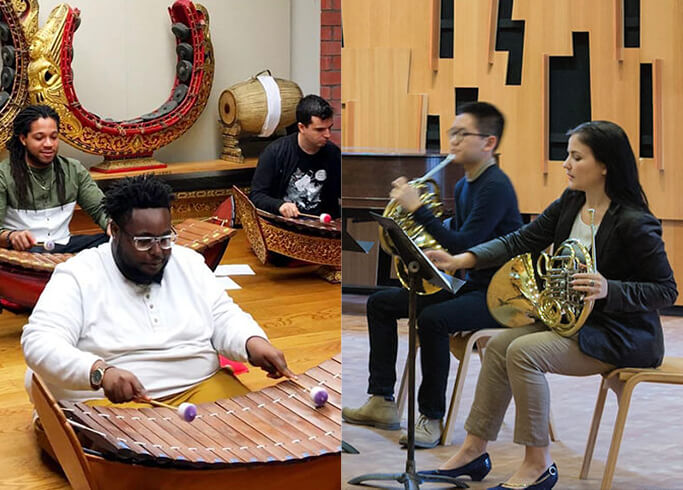A rapid transition to remote instruction proved challenging for music faculty and students around the country. Many elements of music curricula were suddenly thrown into question, perhaps none more visible than the large ensembles where students apply their individual training in bands, choir and orchestra settings. How could students remain engaged during these challenging times? Could unprecedented circumstances facilitate opportunities for innovation?
For Department of Music Chair Travis J. Cross, these were critical questions that required creative solutions. In order to gather diverse perspectives and plan for a potentially remote fall quarter, Cross organized a two-day virtual symposium bringing together School of Music faculty and colleagues from other universities during the summer. The event not only facilitated the exchange of ideas, but also provided an important opportunity for personal and professional connection during a time of physical distance.
“Our faculty members approached remote teaching with enormous flexibility and resourcefulness, but it was important to create a space where we could share and learn from each other’s successes and find ways to make the most of lessons learned by our colleagues in our own classes,” said Cross.
In addition to the virtual gathering, the conducting faculty collaborated to devise an unconventional, cross-departmental substitution for the large ensembles that could not meet on campus: a series of special topics courses investigating other relevant musical issues. “While circumstances forced us to take a pause from rehearsing and performing as bands, choirs and orchestras, we chose to offer our students new opportunities to broaden their artistic worlds, particularly with respect to bridging genres and engaging with our communities,” said Cross.
This inter-disciplinary approach highlighted opportunities unique to The UCLA Herb Alpert School of Music. Colleagues from Ethnomusicology and Global Jazz Studies joined the ensemble faculty from the Department of Music in teaching the special topics courses, with students from all across the School invited to enroll.
The experimental offerings proved successful during the fall and have continued into the current winter quarter, with students moving into different classes and some new options added. Sample course topics available this quarter include:
● Social Justice Issues in Classical Music
● The Entrepreneurial Musician on Social Media
● Improvisation for Classical Musicians
● Discovery of World Music: Learning Music from UCLA Ethnomusicology Faculty and Ensemble Directors
● Creating Inclusive Orchestral Audition Lists
● Historical and Recorded Perspectives: The American Choral Tradition
While students eagerly await a return to in-person instruction and ensemble performance, these special topics courses exemplify creative thinking in the face of unforeseen challenges.
“I am incredibly proud of our faculty who have worked so hard to develop innovative options for our students,” said Eileen Strempel, the school’s Inaugural Dean. “Although we all look forward to our eventual return to in-person ensemble work, these courses allow our students to explore new areas of interest and expand their horizons.”
The faculty will continue to adjust and improve the special topics courses for students during the upcoming spring quarter.
